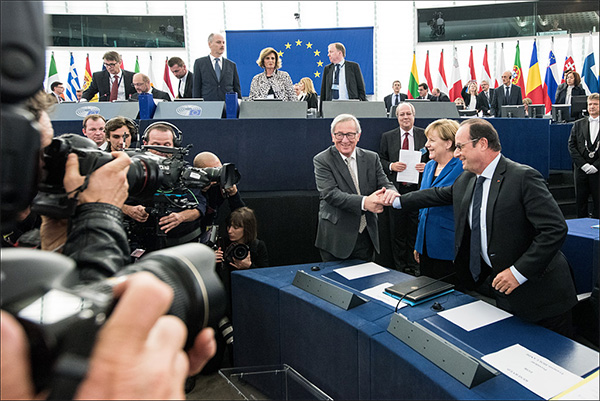
Some of the EU’s poorly sewn seams are splitting. The rift between North and South, or between creditors and debtors, is still there and has been fully solved following the agreement with Greece. The possibility of a Brexit, with the UK breaking away, is quite real. But the greatest internal fissure in the EU is now between East and West, to a large extent also between new and old members. The fracture has come out into broad daylight with the refugee crisis and the decision on the allocation of quotas, imposed by a majority vote against the Czech Republic, Slovakia, Hungary and Romania, and with serious reserves by Poland and the Baltic nations, countries that have generally not had much experience of immigration and multiculturalism. But, above all other considerations, some of them are in a clear process of democratic regression that can undermine the EU’s very foundations and reinforce the same kind of movements in other countries, including those of Western Europe, which are now infected by xenophobic and anti-European populisms.
The split is worrying. It had already been commented after the dissolution of the Warsaw Pact and the end of Soviet rule that they would be reluctant to dilute their regained sovereignty in the EU, which they aspired to join more for matters of interest and security than from a sense of identity. They prefer to rely on the US than on their European partners. They trusted Germany, which has invested heavily in them, although their faith has been broken recently and not just because of the refugee issue but also by fears of Russia and of Berlin coming to an understanding with Moscow. While under NATO protection, the allies have signally failed to move permanent forces –despite having some units on long-term deployment– into the areas closest to the Russian Federation.
Paradoxically, while fearing Russia, some of the eastern Member States’ leaders see in Vladimir Putin something of a political role model. The Hungarian Prime Minister, Viktor Orban, is speaking of rebuilding Europe as an ‘illiberal’ and Christian democracy because, he says, the liberal and secular EU –with porous borders to boot– has failed. He has promoted laws against the freedom of the press and implemented other anti-democratic measures. As noted by the former European Commissioner and former Italian Foreign Minister Emma Bonino last week in Madrid, Orban wants to use the refugee issue to change the EU.
The EU has made no reaction. Although some consider that its activation would mean pressing the ‘nuclear button’, Article 7 of the Treaty of Lisbon, with a sufficient majority in the Council and the European Parliament, requires the initiation of proceedings to ‘determine that there is a clear risk of a serious breach by a Member State of the values’ on which the EU is founded, and even lead to the suspension of the rights of the country concerned. For the time being, the combined resistance of the European Parliament’s two largest groups –Popular and Social Democrat– in its Committee on Civil Liberties, Justice and Home Affairs have rejected such a step and urged the Commission, as it did in June, to submit proposals for ‘establishing a European mechanism of democracy, rule of law and fundamental rights’, which the EU currently lacks. If there are certain requirements as to democratic standards to enter the EU (the so-called ‘Copenhagen criteria’), once inside, the Union seems powerless in the face of instances of regression in some of its Member States. Diplomatic sanctions against Austria in 2000 for the participation of Haider’s xenophobic party were to avail. And the Haiders have mushroomed throughout much of Europe, both East and West.
If at their joint appearance in the European Parliament last week, Angela Merkel and François Hollande criticised nationalism, sovereignism and populist xenophobia, they remained discreet about problems related to democracy. The German Chancellor, who in private did refer to indignity when commenting Hungary’s attitude towards refugees, must be aware that her Bavarian partner, the Social Christian Horst Seehofer, is reluctant to accept more asylum seekers and recently received Orban in Munich, while the latter criticised Germany’s ‘moral imperialism’ to his face.
Viktor Orban clearly won the 2014 elections and the problem is that one of his rivals with the greatest chances of success is even more radical. The situation may deteriorate further in other countries and especially in the most important of these, Poland, where the rightist enemy of further European deepening Andrzej Duda gained the Presidency last summer for his Law and Justice Party is well placed to dominate the general elections scheduled for 25 October. Even a moderate like the Czech President Miloš Zeman has adopted an anti-immigration discourse.
The fact that anti Europeanism and right-wing populism are on the rise in other parts of Europe (Spain and Portugal are so far the fortunate exceptions) does nothing to patch up the spreading rift. At this point the question is how to help these countries return to Europe and embrace liberal democracy. It is not a question of money –they benefit greatly from transfers from the EU– but of geo- and sociopolitical cultures.
The EU’s policy in the Eastern neighbourhood has not produced the expected results. Within it, there are several countries that feel overly isolated. And that feeling can only grow if Merkel and Hollande’s idea of strengthening the Economic and Monetary Union prospers, although some of the most reluctant to accept refugees, such as Slovenia, Slovakia and the Baltic nations, are already in the euro. In any case, it is necessary to establish clear pathways between the Eurozone and the EU as a whole because –except for those who do not want to join (the UK, Denmark and Sweden)– those who cannot must keep up their hopes of joining when they and the Monetary Union are ready.
An in-depth and open debate on democratic regression in the European Parliament and the Council, at the request of the Commission and pursuant to Article7, would be a very healthy exercise and reach out to these countries’ citizens. It would even send a signal to the followers of populisms in the other part of the EU, such as Marine Le Pen, head of the French National Front and another Putin admirer who strongly criticised Merkel and Hollande in Strasbourg. If the EU does not regain its democratic credibility inwardly, it might well become diluted and it will find it increasingly to promote its values beyond its borders. ‘Nationalism is war’, as Hollande warned. And the de-democratisation that accompanies it, can also be considered as such.


